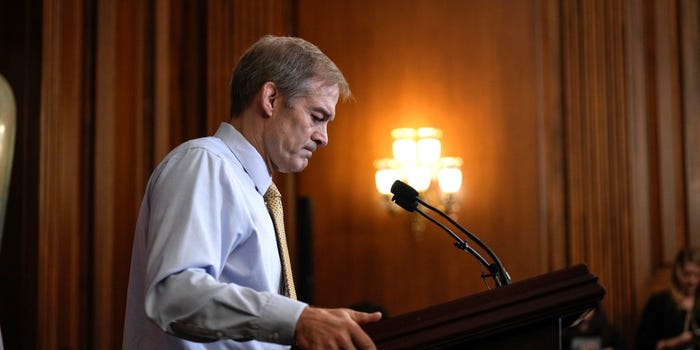Table of Contents
October 20, 2023

Washington, D.C. – Republican Rep. Jim Jordan failed to win the speakership of the House of Representatives for a second time on Wednesday, as the Republican Party continued to struggle to unite behind a leader.
Jordan, a conservative from Ohio who is close to former President Donald Trump, fell short of the 217 votes needed to become speaker. He received 199 votes, down from 200 on the first ballot on Tuesday.
Four Republicans voted against Jordan on the second ballot who had supported him on the first. They were Reps. Vern Buchanan of Florida, Drew Ferguson of Georgia, Mariannette Miller-Meeks of Iowa, and Pete Stauber of Minnesota.
Two Republicans who had not voted for Jordan on the first ballot switched their support to him on the second. They were Reps. Doug LaMalfa of California and Victoria Spartz of Virginia.
Jordan’s failure to win the speakership is a setback for Trump and his allies in the Republican Party. It also raises questions about the future of the House GOP, as the party is now without a leader.
Jordan has said that he will not drop out of the race for speaker, but it is unclear whether he can garner enough support to win. Other Republicans who have been mentioned as possible candidates for speaker include Rep. Kevin McCarthy of California, Rep. Steve Scalise of Louisiana, and Rep. Patrick McHenry of North Carolina.
The House of Representatives cannot begin to conduct business until a speaker is elected. This means that the chamber will be unable to pass legislation or conduct oversight of the Biden administration until this issue is resolved.
The current situation is unprecedented, as the House has never before been without a speaker for an extended period of time. It remains to be seen how the Republican Party will resolve this impasse and when the House will be able to resume normal operations.
Analysis

Jordan’s failure to win the speakership is a sign of the deep divisions within the Republican Party. The party is split between those who are loyal to Trump and those who want to move on from him. This division was evident in the speaker vote, as Jordan was only able to win the support of a minority of Republicans.
Jordan’s candidacy for speaker was also opposed by some Republicans who believe that he is too extreme and too close to Trump. These Republicans are concerned that Jordan would not be able to effectively lead the House and that he would alienate moderate voters.
The failure to elect a speaker is a major setback for the Republican Party. It means that the party will be unable to pass legislation or conduct oversight of the Biden administration until this issue is resolved. It also means that the Republican Party will be unable to project a unified message to the American people.
It is unclear how the Republican Party will resolve this impasse. Jordan has said that he will not drop out of the race for speaker, but it is unclear whether he can garner enough support to win. Other Republicans who have been mentioned as possible candidates for speaker include Rep. Kevin McCarthy of California, Rep. Steve Scalise of Louisiana, and Rep. Patrick McHenry of North Carolina.
It is possible that the Republican Party will eventually be able to unite behind a consensus candidate for speaker. However, it is also possible that the party will remain divided and that the House will be without a speaker for a prolonged period of time. This would be a major setback for the Republican Party and would damage its ability to govern effectively.
Implications for the 2024 Elections

The failure to elect a speaker could have implications for the 2024 elections. If the Republican Party remains divided, it will be difficult for the party to win back control of the House of Representatives.
The failure to elect a speaker could also damage the Republican Party’s chances of winning the presidency in 2024. If the party is seen as being divided and unable to govern effectively, it will be difficult for the Republican nominee to win the support of moderate voters.
Conclusion
The failure of Rep. Jim Jordan to win the speakership of the House of Representatives is a major setback for the Republican Party. It is a sign of the deep divisions within the party and it raises questions about the future of the House GOP.
It is unclear how the Republican Party will resolve this impasse and when the House will be able to resume normal operations. However, it is clear that the failure to elect a speaker is a major embarrassment for the party and that it could have implications for the 2024 elections.
Additional thoughts:
- Jordan’s failure to win the speakership is a blow to Trump’s grip on the Republican Party. However, it is unclear whether this will lead to a split within the party or whether Trump will be able to maintain his influence.
- The Republican Party is now in a state of flux. It is unclear who will emerge as the party’s leader or what direction the party will take in the coming years.
- The failure to elect a speaker is also a setback for the Republican Party’s ability to govern effectively. Without a leader, the party will be unable to pass legislation or conduct oversight of the Biden administration.
- The failure to elect a speaker could have implications for the 2024 elections. If the Republican Party remains divided, it will be difficult for the party to win back control of the House of Representatives.
It is worth noting that the Republican Party has a history of overcoming internal divisions. In the early 2000s, the party was divided between moderates and conservatives. However, the party was able to unite behind George W. Bush and win the presidency in 2000 and 2004.
It is possible that the Republican Party will be able to do the same thing in 2024. However, it is also possible that the party’s divisions will deepen and that the party will be unable to unite behind a single candidate. This would make it difficult for the Republican Party to win the presidency in 2024.


